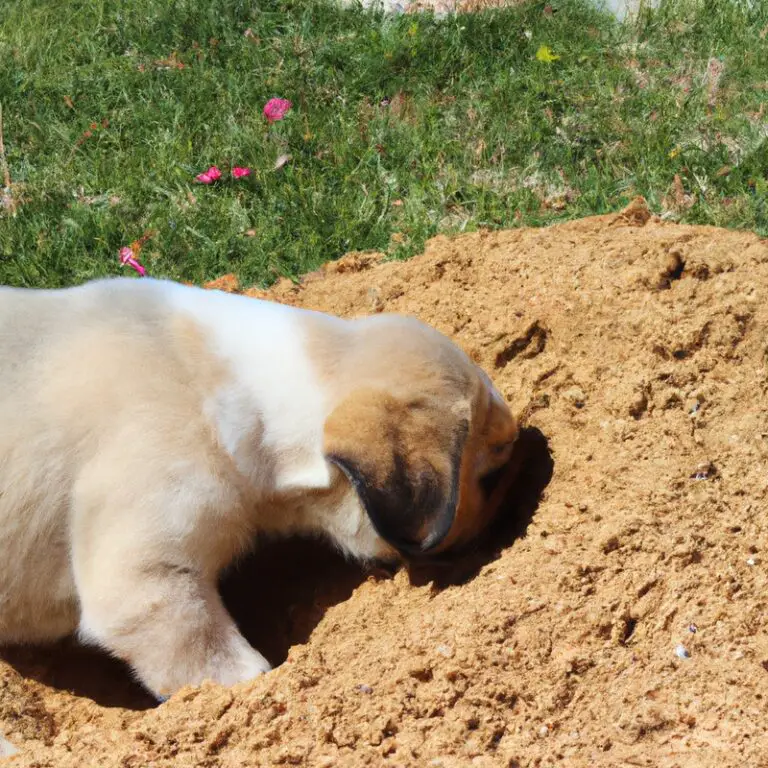Why Is My Female Dog Digging – Explained!
Key Takeaways:
- Female dogs may dig due to instinctual behaviors, such as creating a safe den or searching for prey.
- Digging may also be a sign of boredom or lack of mental stimulation in female dogs.
- Hormonal changes during the estrus cycle can sometimes lead to increased digging behavior in female dogs.
- Addressing the underlying causes, providing mental and physical stimulation, and ensuring a comfortable environment can help reduce excessive digging in female dogs.
Are you grappling with the mystery of why your female dog has suddenly taken up the hobby of digging? It can be quite baffling to watch your furry friend frantically dig up your yard or garden.
But fear not, dear reader, for in this article, we shall dive into the fascinating world of female dog behavior and unravel the reasons behind their digging antics.
From instinctual behaviors to potential health issues, we’ll explore it all. So, join me as we venture into the realm of canine digging and discover practical tips to manage this behavior effectively.
Get ready to dig deeper!
| Reason | Possible Explanation |
|---|---|
| Boredom | Female dogs may dig out of boredom when they do not have enough mental and physical stimulation. |
| Escape | Female dogs may dig if they are trying to escape or explore beyond their confined area or if they sense something interesting on the other side. |
| Buried Objects/Scents | Dogs have a strong sense of smell which may lead them to dig when they detect buried objects like bones or when they smell other animals’ scents. |
| Nesting | Pregnant female dogs may dig to create a nest as they prepare for the arrival of their puppies. This behavior is instinctive and serves as a way to provide safety and comfort for the newborns. |
| Anxiety/Stress | Female dogs may dig as a way to cope with anxiety or stress. This behavior can occur due to separation anxiety, fear, or changes in their environment. |
Understanding the Behavior of Female Dogs
Understanding the behavior of female dogs can help you better address their needs and manage any unwanted behavior.
Differences in Behavior between Male and Female Dogs
Male and female dogs can have distinct behavioral differences.
Here are a few things to keep in mind:
- Energy levels: Male dogs tend to be more energetic and may require more exercise to burn off that energy. Females, on the other hand, often have more consistent energy levels.
- Dominance: Male dogs may exhibit more dominant behaviors, such as marking territory or displaying aggression towards other male dogs. Female dogs can be more assertive and protective of their family.
- Socialization: Both genders benefit from socialization, but males may be more prone to competing for dominance within a group. Females tend to be more receptive to other dogs and often prefer cooperative play.
- Maturity: Male dogs often take longer to mature emotionally and may display puppy-like behaviors even when fully grown. Females typically mature faster and are more emotionally stable.
Remember, every dog is unique, and individual differences can outweigh gender tendencies.
Proper training, socialization, and understanding your dog’s personality are key to a happy and well-adjusted pet.

Possible Reasons for Female Dogs Digging
Female dogs may exhibit digging behavior due to various reasons.
Here are some possible explanations:
- Seeking Comfort: Digging can be a way for female dogs to create a comfortable spot to rest or escape from extreme temperatures.
- Instinctual Behavior: Dogs have a natural instinct to dig, which can be traced back to their ancestors who used to dig to create dens for protection and raising young.
- Boredom or Excess Energy: If a female dog is under-stimulated or lacks physical and mental exercise, she may resort to digging as a way to alleviate boredom.
- Hunting or Hiding Objects: Some female dogs may dig to bury toys, bones, or even their food as a way to save them for later.
- Escape or Attention: Sometimes, female dogs may dig under fences or in the backyard as an attempt to escape or get attention from their owners.
Understanding the underlying reason behind your female dog’s digging can help you address the behavior appropriately and find ways to redirect her energy into more desirable activities.
Natural Instincts and Denning Behavior
Female dogs’ natural instincts and denning behavior play a significant role in their digging behavior.
As pack animals, dogs have an innate desire to create a den-like space for themselves and their potential offspring.
Digging helps them achieve this, as it allows them to create a comfortable and secure area to rest and protect their young.
This behavior is instinctual and can be challenging to eliminate.
Providing an alternative digging area or engaging in activities that stimulate their natural instincts can help redirect this behavior.

Potential Health Issues Leading to Digging
There are several potential health issues that could lead to digging behavior in your female dog.
Some of these include skin irritation or allergies, parasites such as fleas or mites, pain or discomfort related to joint or muscle issues, and even hormonal imbalances.
Digestive problems or dietary deficiencies can also contribute to digging behavior.
If your female dog seems to be digging excessively, it is important to consult with your veterinarian to rule out any underlying health concerns and get appropriate treatment.

How to Distinguish between Normal Digging and Problematic Behavior
The key to distinguishing between normal digging and problematic behavior in female dogs is to consider the frequency, intensity, and purpose of the digging. Normal digging typically occurs occasionally and in specific areas, such as when they are burying a bone or creating a comfortable spot to lie down.
It is a natural behavior for dogs to engage in, and it usually does not cause any harm or destruction.
On the other hand, problematic digging involves excessive and destructive digging behaviors that persist despite attempts to redirect or discourage them. Problematic digging may have underlying causes such as anxiety, boredom, or a medical issue.
It can result in damage to the yard, injuries, or escape attempts.
If your female dog’s digging becomes a problem, it is important to assess the frequency, intensity, and purpose of the behavior, along with any accompanying signs of distress or dissatisfaction. Consulting with a veterinarian or a professional dog trainer can help you determine the underlying cause and develop a plan to address the behavior effectively.
Practical Tips for Managing Digging Behavior in Female Dogs
Managing digging behavior in female dogs can be tricky, but it’s not impossible. Here are some practical tips to help you out:
- Provide plenty of mental and physical stimulation. A tired dog is less likely to dig out of boredom or excess energy.
- Create a designated digging area in your yard. This can be a sandbox or a specific spot where your dog is allowed to dig freely.
- Use positive reinforcement training. Reward your dog when she redirects her digging behavior to the designated area.
- Secure your yard to prevent escape. Make sure your fences are tall enough and consider using underground barriers to deter digging.
- Keep your dog indoors or supervised when you’re unable to supervise her outside. This prevents her from digging up your garden or causing any damage.
Remember, consistency and patience are key when it comes to managing any unwanted behavior in your furry friend. With time and effort, you can help your female dog overcome her digging habits.
Providing Adequate Mental and Physical Stimulation
To ensure your female dog doesn’t start digging excessively, it’s important to provide her with adequate mental and physical stimulation.
Firstly, engage your dog in regular exercise to burn off excess energy.
Encourage interactive play sessions and consider puzzle toys to keep her mind active.
Secondly, provide opportunities for socialization with other dogs and humans.
Taking her for walks, visiting dog parks, or enrolling in obedience classes can help fulfill her social needs.
Lastly, offer a variety of chew toys and bones to satisfy her natural desire to chew.
Remember, a stimulated dog is a happy and well-behaved dog.
Redirecting Digging Behavior with Positive Reinforcement
If your female dog is constantly digging up your yard, don’t worry, you can redirect this behavior with positive reinforcement. Here’s how:
- Provide an alternative digging area: Create a designated spot in your yard where it’s okay for your dog to dig. Use sand or soft soil to make it more appealing. Show your dog where it is and praise her when she digs there.
- Increase mental and physical stimulation: Dogs often dig out of boredom or excess energy. Make sure your dog gets plenty of exercise and mental stimulation through walks, playtime, and puzzle toys. This can help alleviate the urge to dig.
- Supervise and redirect: If you catch your dog starting to dig in an undesirable area, calmly redirect her to the designated digging spot. Reinforce positive behavior by rewarding her with treats or praise when she digs in the right spot.
- Provide distractions: Keep your dog entertained and distracted from digging by providing toys and activities she enjoys. This can help redirect her focus and energy away from digging.
Remember, it’s important to be patient and consistent when redirecting your dog’s behavior. Positive reinforcement and consistent training will help your female dog learn where it’s appropriate to dig and keep your yard intact.
Ensuring Sufficient Exercise and Daily Routine
Ensuring your female dog gets enough exercise and follows a consistent daily routine is key to their overall well-being. Regular exercise helps to burn off excess energy and prevents behavioral problems like excessive digging.
Establishing a daily routine provides structure and helps your dog feel secure.
Aim for at least 30 minutes of exercise twice a day, incorporating activities like walks, playtime, and mental stimulation. Stick to a set schedule for meals, walks, and playtimes to maintain consistency.
Creating a Suitable Digging Area for Your Female Dog
Creating a Suitable Digging Area for Your Female Dog:
- Designate a specific space in your yard where your female dog can dig freely.
- Choose an area with soft soil or sand, as it mimics the natural texture dogs enjoy digging in.
- Encourage your dog to use the designated area by burying toys or treats for her to find.
- Provide shade and shelter near the digging area to create a comfortable environment.
- Regularly reinforce the behavior of digging in the designated area through positive reinforcement and rewards.
- Ensure the safety of your dog by avoiding toxic plants or hazardous objects in the digging area.
- Remember, creating a suitable digging area for your female dog can help redirect her natural instinct to dig while keeping your yard intact.
Frequently Asked Questions (FAQs) about Female Dogs Digging
Why do female dogs dig holes?
Female dogs dig holes for a variety of reasons.
It could be due to instinctive behavior, such as creating a safe and comfortable spot to give birth or hide their puppies.
They may also dig to regulate their body temperature, especially in hot weather.
Another reason could be boredom or a way to release energy.
Some female dogs may dig to bury or hide their treasures, such as toys or bones.
It’s important to understand the underlying cause and address it appropriately to prevent excessive digging.
Is digging behavior only limited to female dogs?
Digging behavior is not limited to female dogs. Both male and female dogs may engage in digging for various reasons.
Dogs may dig to create a comfortable sleeping area or to escape from confinement.
They may also dig to hide food or toys, alleviate boredom, or fulfill their natural instincts. It’s important to understand and address the underlying reasons behind your dog’s digging behavior to effectively manage it.
Can spaying/neutering help reduce digging behavior in female dogs?
Yes, spaying/neutering can help reduce digging behavior in female dogs. When a female dog is spayed, the surgery removes her ovaries and uterus, leading to a decrease in hormone levels.
This hormonal change can help reduce certain behaviors, including excessive digging.
However, it’s important to note that every dog is unique, and spaying/neutering alone may not completely eliminate digging behavior. Providing mental and physical stimulation, training, and creating a designated digging area can also be helpful in managing this behavior.
When should I be concerned about my female dog’s digging behavior?
You should be concerned about your female dog’s digging behavior if it becomes excessive or destructive.
Excessive digging may indicate anxiety, boredom, or the need for more physical and mental stimulation.
If your dog is causing damage to your yard or is at risk of escaping, it’s important to address the issue.
Additionally, digging can be a sign of a medical problem, such as allergies or skin irritations.
If you’re unsure about your dog’s digging behavior, it’s best to consult with a veterinarian or a professional dog trainer for guidance.
Are there any specific dog breeds more prone to excessive digging?
Yes, there are certain dog breeds that are more prone to excessive digging.
Some of these breeds include Terriers (such as Jack Russell Terriers, Rat Terriers, and Dachshunds), Beagles, Huskies, and Border Collies.
These breeds were historically bred for specific purposes like hunting, herding, and digging out prey.
So, their natural instincts and tendencies make them more likely to engage in digging behaviors.
However, it’s important to remember that every dog is an individual, and digging habits can vary even within breeds.
Can digging behavior be a sign of an underlying health issue in female dogs?
Digging behavior in female dogs can sometimes be a sign of an underlying health issue.
It could indicate conditions like skin allergies, hormonal imbalances, or even parasites.
If you notice excessive digging, along with other symptoms like scratching, hair loss, or changes in appetite and behavior, it’s essential to consult with your veterinarian.
They can help determine the root cause and recommend appropriate treatment options to address the health issue and curb the digging behavior.
How long does it take to modify a female dog’s digging behavior?
Modifying a female dog’s digging behavior can take time and patience. The duration will vary depending on several factors, including the dog’s age, temperament, and past experiences.
On average, it may take several weeks to a few months to see significant changes in the behavior.
Consistency in training, providing alternative outlets for energy and mental stimulation, and positive reinforcement are key. Working with a professional dog trainer or behaviorist can also help expedite the process.
Remember, every dog is unique, so be prepared for individual variations in the timeline.
What are some alternative solutions to prevent or minimize digging behavior in female dogs?
To prevent or minimize digging behavior in female dogs, you can try the following alternative solutions:
- Provide mental and physical stimulation: Engage your dog in regular exercise and playtime to tire them out and redirect their energy away from digging.
- Designate a digging area: Create a designated space in your yard where your dog is allowed to dig, such as a sandbox or an area filled with loose soil. Encourage them to use this area by burying toys or treats for them to find.
- Distract and redirect: When you catch your dog digging in an undesired area, redirect their attention to an appropriate activity, such as playing fetch or giving them a puzzle toy filled with treats.
- Ensure proper supervision: Supervise your dog while they are outside to discourage digging behavior. Keep them on a leash or use a secure fence to prevent access to areas where they tend to dig.
- Seek professional help: If your dog’s digging behavior persists despite your efforts, consider consulting with a professional dog trainer or behaviorist who can provide personalized guidance and training techniques.
Remember, consistency and patience are key when working to modify your dog’s digging behavior. By implementing these alternative solutions, you can help discourage digging and create a more harmonious environment for both you and your furry friend.
Final Verdict
Understanding the behavior of female dogs and the reasons behind their digging habits is crucial for effective management.
While digging can be a natural instinct and denning behavior, it can also be a sign of potential health issues.
Distinguishing between normal digging and problematic behavior is important.
To address this behavior, providing adequate mental and physical stimulation, redirecting with positive reinforcement, ensuring a sufficient daily routine, and creating a suitable digging area can be helpful.
By implementing these practical tips, you can minimize and redirect your female dog’s digging behavior, improving her overall well-being and the harmony in your home.







